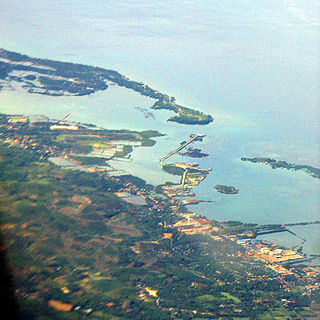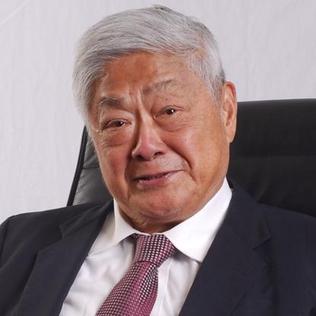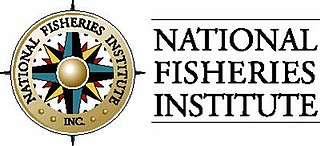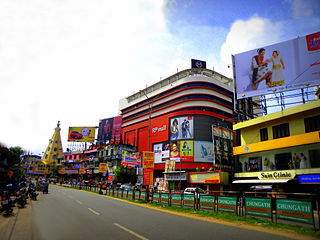| Type | Privately held company |
|---|---|
| Founded | 1986 |
| Headquarters | Cebu, Philippines |
Key people | Felisa P. Ng, CEO and Chairperson |
Akai Foods, Inc. is a multinational fishery company headquartered in the Philippines, [1] specializing in farming, processing, and exporting a variety of seafood. [2] [3]
Established in 1986, the family-run company is a member of Philippine Exporters Confederation and the Association of Food Manufacturers and Exporters of Cebu. [4] The company is a supplier internationally, with ties throughout China, the United States, Eastern Europe, and South America. [5] [6]
The company's main facilities are in Mandaue in Cebu province, in close proximity to the Port of Cebu. [7] Akai Foods currently has a network of hundreds of fishers and affiliate traders under its operation. Products include seaweed, abalone, squid, cuttlefish, shellfish, parrot fish, tuskfish, fried fish fingers, lobster balls, and fish oil. [8] [9] [10]

The economy of the Philippines is an emerging market, a newly industrialized country and one of the most dynamic in Asia-Pacific region. As a developing economy, the country is working towards achieving greater industrialization and economic growth. The Philippine economy is the world's 36th largest by nominal GDP and 15th largest in Asia according to the International Monetary Fund in 2023.

Jollibee is a Filipino chain of fast food restaurants owned by Jollibee Foods Corporation (JFC). As of December 2021, JFC had a total of about 1,500 Jollibee outlets worldwide, with restaurants in Southeast Asia, the Middle East, East Asia, North America, and Europe.

Mandaue, officially the City of Mandaue, is a 1st class highly urbanized city in the Central Visayas region of the Philippines. According to the 2020 census, it has a population of 364,116 people.

San Miguel Corporation, abbreviated as SMC, is a Philippine multinational conglomerate headquartered in Mandaluyong, Metro Manila. The company is one of the largest and most diversified conglomerates in the Philippines. Originally founded in 1890 as brewery in the Philippines, San Miguel has ventured beyond its core business, with investments in various sectors such as food and drink, finance, infrastructure, oil and energy, transportation, and real estate.

Carmen, officially the Municipality of Carmen, is a 3rd class municipality in the province of Cebu, Philippines. According to the 2020 census, it has a population of 57,897 people.

Filipino cuisine is composed of the cuisines of more than a hundred distinct ethnolinguistic groups found throughout the Philippine archipelago. A majority of mainstream Filipino dishes that compose Filipino cuisine are from the food traditions of various ethnolinguistic groups and tribes of the archipelago, including the Ilocano, Pangasinan, Kapampangan, Tagalog, Bicolano, Visayan, Chavacano and Maranao ethnolinguistic groups. The dishes associated with these groups evolved over the centuries from a largely indigenous base shared with maritime Southeast Asia with varied influences from Chinese, Spanish and American cuisines, in line with the major waves of influence that had enriched the cultures of the archipelago and adapted using indigenous ingredients to meet local preferences.

Fish balls are balls made from fish paste which are then boiled or deep-fried. Similar in composition to fishcake, fish balls are often made from fish mince or surimi, salt, and a culinary binder such as tapioca flour, corn, or potato starch.

John Robinson Lim Gokongwei Jr. was a Chinese Filipino businessman, investor, and philanthropist. His conglomerate company JG Summit Holdings, Inc., had an extensive panoply of business and investment holdings across the Filipino economy, including shipping, telecommunications, retail, financial services, petrochemicals, utilities, aviation, food, beverages, and livestock farming.

Established in 1897, Franklin Baker Company is a manufacturer and exporter of desiccated and processed coconut products in the U.S. and abroad. The company manufactures the retail coconut brand Baker's Coconut.
JG Summit Holdings, Inc. (JGSHI) is one of the largest conglomerates in the Philippines with business interests in air transportation, banking, food manufacturing, hotels, petrochemicals, power generation, publishing, real estate and property development, and telecommunications. Key subsidiaries include Universal Robina and Cebu Pacific. Incorporated on November 1990, JG Summit Holdings was founded by John Gokongwei Jr., one of the wealthiest individuals in Southeast Asia. In 2010, JGSHI was one of the ten most profitable companies on the Philippine Stock Exchange.
Sergio R. Ortiz-Luis Jr. is a management practitioner in the Philippines. He is the Chairman of the Philippine Chamber of Commerce and Industry (PCCI), the official chamber of commerce of the Philippines. He is the honorary chairman and president of the Employers Confederation of the Philippines (ECOP).

The National Fisheries Institute (NFI) is the United States industry trade group representing the seafood industry. It is a member of the International Coalition of Fisheries Associations (ICFA). Its member companies consist of all levels of business involved in seafood, from fishing vessel operators to seafood restaurants.

Agriculture in the Philippines is an important sector in the economy with crops like bananas, coconuts, pineapples, rice and sugarcanes are being mass-produced for exportation but the challenge remains as it steadily running into deficit amid growing population. As of 2022, the sector employs 24% of the Filipino workforce and it accounted for 8.9% of the total GDP.

Canada's fishing industry is a key contributor to the success of the Canadian economy. In 2016, Canada's fishing industry exported $6.6 billion in fish and seafood products and employed approximately 72,000 people in the industry. Aquaculture, which is the farming of fish, shellfish, and aquatic plants in fresh or salt water, is the fastest growing food production activity in the world and a growing sector in Canada. In 2015, aquaculture generated over $1 billion in GDP and close to $3 billion in total economic activity. The Department Of Fisheries and Oceans (DFO) oversees the management of Canada's aquatic resources and works with fishermen across the country to ensure the sustainability of Canada's oceans and in-land fisheries.

Phoenix Petroleum Philippines, Inc. is the first independent oil company to be listed in the Philippine Stock Exchange after the Oil Deregulation Law was passed in 1998. It is the first company from Davao City to be listed in the Philippine Stock Exchange.

As of 2005, the Philippines was the ninth largest sugar producer in the world and second largest sugar producer among the Association of Southeast Asian Nations (ASEAN) countries, after Thailand, according to Food and Agriculture Organization. At least seventeen provinces of the Philippines have grown sugarcane, of which the two on Negros Island account for half of the nation's total production. As of crop year 2009–2010, 29 sugar mills are operational divided as follows: thirteen mills on Negros, six mills on Luzon, four mills on Panay, three mills in Eastern Visayas and three mills on Mindanao.

Kollam or Quilon is an old seaport and a city on the Laccadive Sea coast in Kerala, India, on Ashtamudi Lake. The city remains notable as the ancient commercial capital of Kerala and the southwestern Indian coast, in addition to its fame as the "Cashew Capital of the World". The Kollam Municipal Corporation has the second largest budget in Kerala in terms of revenue and expenditure.
The chocolate industry in the Philippines developed after introducing the cocoa tree into Philippine agriculture. The growing of cacao or cocoa boasts a long history stretching from the colonial times. Originating from Mesoamerican forests, cacao was first introduced by the Spanish colonizers four centuries ago. Since then the Philippine cocoa industry has been the primary producer of cocoa beans in Southeast Asia. There are many areas of production of cacao in the Philippines, owing to soil and climate. The chocolate industry is currently on a small to medium scale.

Aboitiz Equity Ventures (AEV) is a Philippine holding company based in Metro Manila, with roots from Cebu City. The conglomerate operates in six major industries: Power, Banking and Financial Services, Food, Infrastructure, and Data Science and Artificial Intelligence. In 2017, the company was ranked 1793rd on the Forbes Global 2000. In 2022, AEV ventured into transforming its organization into a "Techglomerate" - a faster, stronger, and better version of a conglomerate. A techglomerate can refer to a startup tech company that has grown into a conglomerate or a legacy conglomerate that has used technology and startup culture to radically transform the way it behaves and operates. AEV is the latter of the two.

The automotive industry in the Philippines is the 9th largest in the Asia-Pacific region, with approximately 273.4 thousand vehicles sold in 2019. Most of the vehicles sold and built in the Philippines are from foreign brands. For the most part, the Philippines is dominated by Japanese automobile manufacturers like most of its ASEAN neighbors. The automobile production in the country is covered under the Philippine Motor Vehicle Development Program implemented by the Board of Investments. In addition, there are also a small number of independent firms who assemble and fabricate jeepneys and other similar vehicles, using surplus engines and drivetrain parts mostly from Japan.